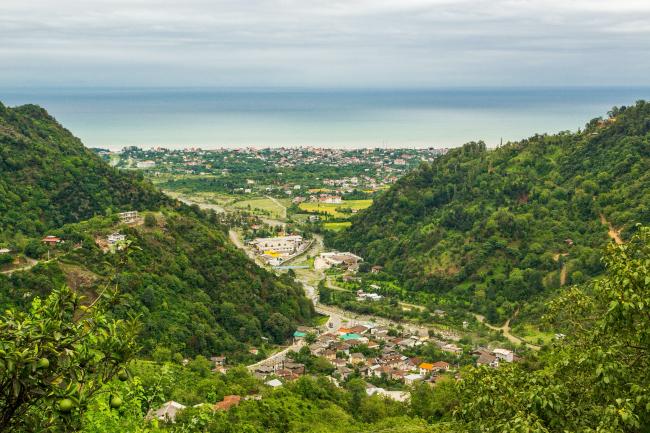
About the Tehran Convention
History of the Convention
The Framework Convention for the Protection of the Marine Environment of the Caspian Sea, also known as the “Tehran Convention” named after the city where it was adopted in 2003, is the first legally binding regional agreement signed by all five Caspian littoral States, the Republic of Azerbaijan, the Islamic Republic of Iran, the Republic of Kazakhstan, the Russian Federation and Turkmenistan. It lays down the general requirements and the institutional mechanism for environmental protection in the Caspian region.
The need for joint protection and management of the Caspian environment and its resources has been an ongoing issue for the Caspian littoral states. Particularly, since the collapse of the Soviet Union in 1991, the five littoral States have shown increased interest in joint cooperation for the protection of the Caspian Sea. While a number of non-binding regional agreements were reached in the 1990s, they did not bring about the desired results. In 1998, the Caspian Environment Programme (CEP) was established as a regional umbrella programme with the aim to halt the deterioration of environmental conditions of the Caspian Sea and to promote sustainable development in the region for the long-term benefit of the Caspian population.

Since its establishment the CEP has addressed multiple environmental issues by developing a coordinated management structure, regional and national action plans and various transnational measures to tackle the imminent dangers the Caspian environment is facing. The CEP, funded by the littoral states, the European Union and the international community through the Global Environment Facility (GEF), has provided the basis for the efforts of the Caspian States to negotiate and finalize the Tehran Convention.
The Tehran Convention serves as an umbrella legal instrument which does not only aim at protecting the Caspian environment from all sources of pollution, but also targets the preservation, restoration and protection of the Caspian Sea species and habitats. To reach these objectives, it applies internationally acknowledged environmental principles including the precautionary principle, the polluter pays principle and the principle of access to information. The Convention includes provisions on the sustainable and rational use of living resources of the Caspian Sea, on environmental impact assessment and environmental monitoring, as well as research and development. Further to the general obligations of the Tehran Convention, the littoral States are required to take all appropriate measures to achieve these objectives individually or jointly and to cooperate with international organizations to that end.
Former UN Secretary-General, Mr. Kofi Annan, stressed that the signing of the Tehran Convention is a “significant step forward for the region” and that “this landmark treaty will benefit the health and livelihoods of hundreds of millions of people”.
The signing of the Convention marked the culmination of a complex and politically sensitive intergovernmental negotiation process which has lasted for eight continuous years. Driven under the auspices of UNEP within the framework of the CEP and following a fast ratification process by all five Governments of the Caspian littoral states, the Tehran Convention entered into force on 12th August 2006.
Four ancillary Protocols to the Convention have been developed, covering priority areas of concern namely the: 1) Protocol on the Conservation of Biological Diversity, 2) Protocol on the Protection of the Caspian Sea against Pollution from Land based Sources and Activities, 3) Protocol concerning Regional Preparedness, Response and Co-operation in Combating Oil Pollution Incidents, and 4) Protocol on Environmental Impact Assessment in a Transboundary Context.
The Protocol Concerning Regional Preparedness, Response and Co-operation in Combating Oil Pollution Incidents ("Aktau Protocol") was adopted at the Third Meeting of the Conference of the Parties in Aktau, Kazakhstan on August 12, 2011. It entered into force on 25 July 2016.
The Protocol on the Protection of the Caspian Sea against Pollution from Land based Sources and Activities ("Moscow Protocol") was adopted at the Fourth Meeting of the Conference of the Parties in Moscow, Russian Federation on December 12, 2012.
The Protocol for the Conservation of Biological Diversity ("Ashgabat Protocol") was adopted at the Fifth Meeting of the Conference of the Parties in Ashgabat, Turkmenistan on May 30, 2014.
The Protocol on Environmental Impact Assessment in a Transboundary Context was adopted at the First Extraordinary Meeting of the Conference of the Parties in Moscow, Russian Federation on 20 July 2018.
A fifth Protocol on Monitoring, Assessment and Information Exchange is currently under negotiation.
